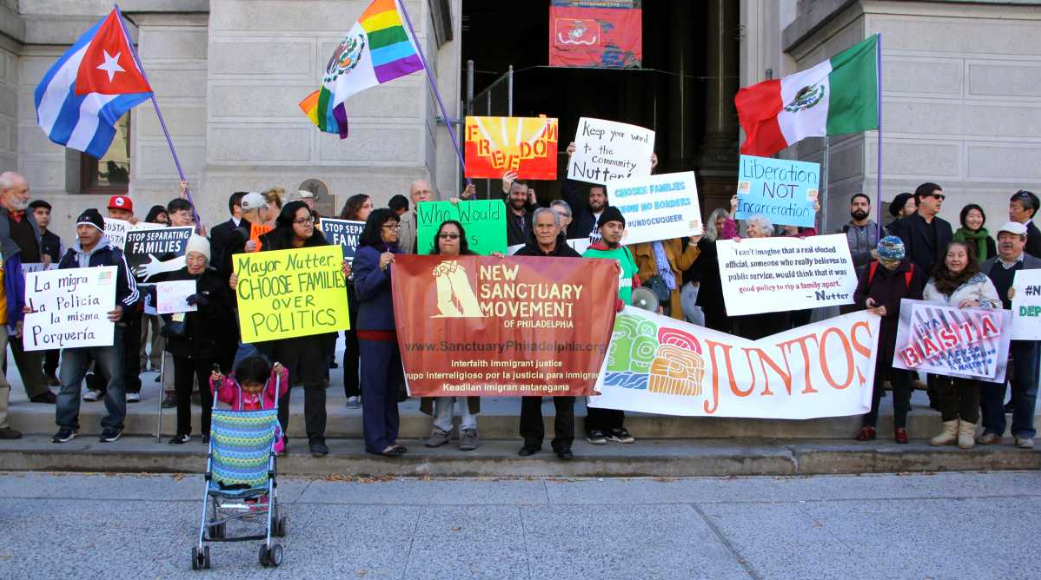Risks of retribution over sanctuary city status include prosecuting local officials

Protesters gather at City Hall to support undocumented immigrants in November of 2015. (Emma Lee/WHYY)
As officials in Philadelphia and hundreds of other jurisdictions ready to fight President-elect Donald Trump’s pledge to deprive cities of federal funding for not cooperating with immigration authorities, there’s one issue that some have dubbed the nuclear option: prosecuting local leaders for illegally harboring undocumented immigrants.
Under federal law, it is a felony to “encourage or induce” those who are in the country illegally to stay in the U.S., and violating the statute is punishable with a fine and up to five years in prison.
Does this mean Mayor Jim Kenney and other city leaders could be criminally liable for not helping Immigration and Customs Enforcement agents with deportation investigations?
“I don’t think it would be necessary,” said Claude Arnold, former ICE special agent who oversaw Homeland Security investigations, who worked across five presidential administrations under the leadership of both parties. “But I think that people need to be made aware of the possibility of it.”
Arnold said over his career, he helped investigate officials, including probation officers, under the harboring statute that resulted in criminal convictions.
Top federal officials under President Obama are not meddling in local decisions to not cooperate with ICE, he pointed out.
“And that’s why these sanctuary jurisdictions know that, and are emboldened by it, they know nobody is going to challenge it. They’ve run amok,” Arnold said.
That’s about to change, he predicted. “If someone were to tell them this is in violation of federal law, you get public officials’ attention.”
Others took a more tempered view.
“The harboring statute is written extremely broadly,” said Rick Su, a law professor at the University of Buffalo and an expert on immigration law enforcement. He said city officials could theoretically be charged under the law, while adding, “I still think such a conviction is unlikely.”
The state Legislature could pass a law that would criminalize withholding assistance to federal immigration officials, as was proposed in Harrisburg this year, though Su said it would likely be quickly challenged in court.
“There is a lot more leeway for states to control local officials than the federal government,” Su said. “But then to say that individual mayors or police officers are then criminally liable? I see it very unlikely that a court would uphold that.”
Drying up law enforcement funding
A much more immediate threat to Philadelphia and other sanctuary cities, Arnold said, would be removing federal support. Just one example he said, is that the U.S. Justice Department shares the proceeds from selling civil forfeiture items with local municipalities. Last year, federal officials paid Pennsylvania counties $7.8 million through this program, records show.
“That’s a stroke-of-a-pen thing that a president could do,” Arnold said. “And if that were to dry up, that would get the attention of state and local officials.”
And in July, Justice Department officials indicated that remaining a sanctuary city could jeopardize federal law enforcement grant money.
Such actions could be perilous, however, since so many federal prosecutions require local assistance.
“That’s a two-edged sword,” Arnold said. “I’m not sure that would be a good way to go because it would sour relationships between federal agencies and the state and locals.”
Alabama U.S. Sen. Jeff Sessions, Trump’s pick for attorney general, will hold substantial power over what enforcement actions will be taken against sanctuary cities like Philadelphia.
Sessions, who is opposed to creating a pathway to citizenship for the 11 million residents in the country illegally, could order government attorneys to sue state and local agencies, seeking an injunction from a judge to force cities to start working with immigration agents.
But given the breadth of the federal harboring law, winning an injunction will not be a sure bet, Su explained.
Most sanctuary cities are not providing “sanctuary” per se by trying to shield undocumented immigrants from detention in the same way a church might barricade its doors against federal agents, he said. Rather, most local agencies that participate are not asking about the immigration status of people they encounter.
“But it doesn’t actually conceal or shield undocumented immigrants from federal detection,” Su said.
When local authorizes refuse to honor federal immigration detainers, as what allegedly happened last week, it becomes a closer case; even there, however, legal murkiness remains.
“Does that mean that local officials must affirmatively use their holding cells and resources as immigration detention facilities?” Su said. “Would letting an individual out into the general public mean that they are ‘concealing’ or ‘shielding’ when they are doing nothing to prevent federal officials from finding them and taking them into custody?”
Kenney’s office said in a statement that Philadelphia’s committed to being a city open to diversity and inclusion, and it will fight to keep its current policy.
City mayors and other local and state officials are typically insulated from criminal activity when they pass legislation, so much of the speculation against targeting city officials, Su said, is likely just hype.
“There are strong immunities protecting legislatures and executives precisely because of the role that they play when they are acting within their official capacities,” Su said.
“There is a huge body of literature on civil rights violations, which individuals can pursue against municipalities or officials in their individual capacity. But none of those involve prosecutions.”
WHYY is your source for fact-based, in-depth journalism and information. As a nonprofit organization, we rely on financial support from readers like you. Please give today.




